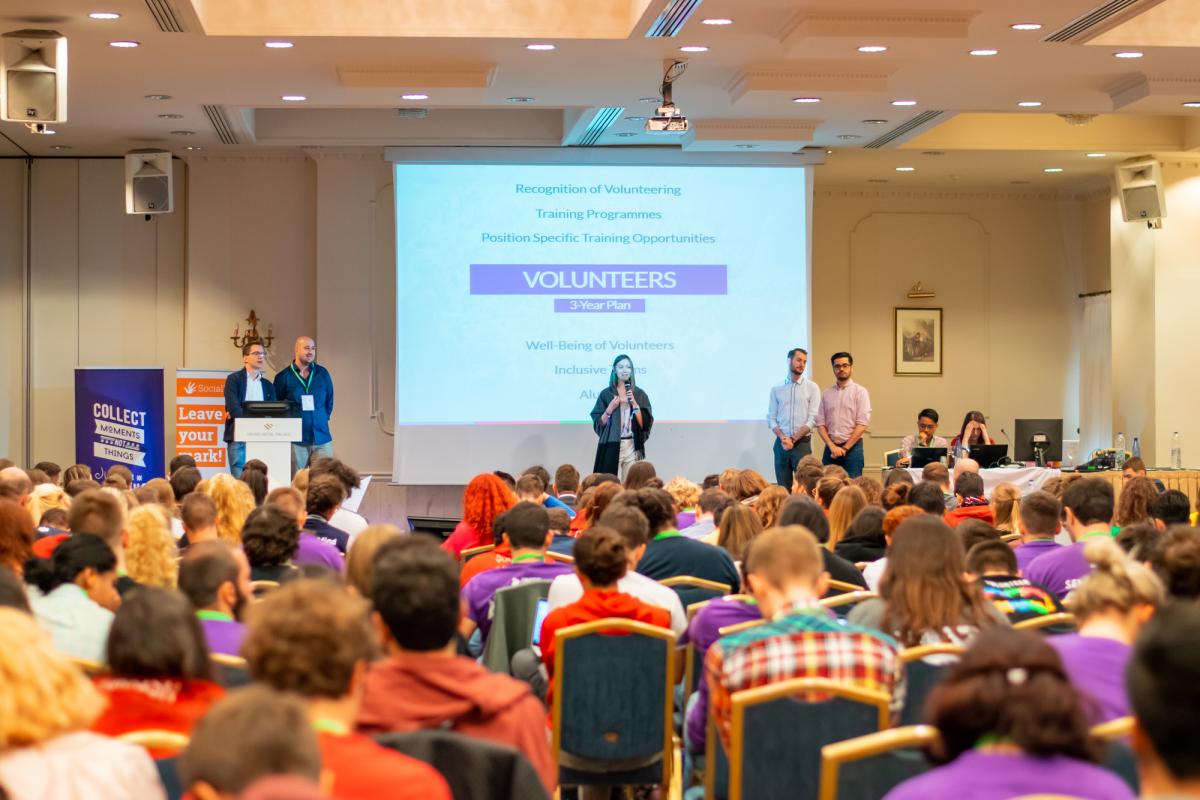
The vision and mission statements form the foundation for all activities in an organization. In 2009, when the last mission and vision were adopted, the Erasmus Student Network (ESN) had 303 local associations across 33 European countries. Since then ESN has grown substantially in the past years in all of its fields, now counting 527 local associations and 13,000 volunteers in 39 countries.
The Erasmus+ Programme is also growing: in its new phase after 2021, the European Commission plans to provide learning and mobility opportunities to 12 million people, in comparison to 4 million in the current programme. As a consequence, an increasing number of exchange students from outside of Europe and more people from diverse backgrounds request the support of ESN and its volunteers.
Acknowledging the responsibility to answer to this demand, ESN International carried widespread consultations in which thousands of ESN volunteers across all regions of the European continent have expressed their ideas for the future of the organisation. This effort resulted in a new ESN vision for a new decade, which was approved by the ESN members this April, at the Annual General Meeting in Thessaloniki.
Vision
''By 2025, ESN will be the global network of the Erasmus Generation, committed to improving international education and providing self-development opportunities to two million young people, fostering intercultural understanding and creating positive change in society.''
ESN envisions a network of people, a global movement, a generation with shared values. International education with a focus on personal and professional self-development of young people, both students and ESN volunteers. ESN aims to provide international students with opportunities to develop their skills, especially by connecting them with the local communities.
ESN fosters internationalisation at home in the local communities and improves the quality of student mobility. Consequently, ESN highlights the importance of student mobility as a crucial factor to make Europe and the world a place of more equity and understanding.

While this vision focuses on the future, ESN’s mission is dedicated to everyday activities. Describing the continuous commitment of thousands of volunteers across Europe, the mission statement adopted at the Annual General Meeting in Thessaloniki is as follows:
Mission
‘’Enrichment of society through international students.”
The new vision for a new decade is supported by six strategic priorities, defining the areas of work crucial for bridging the gap between the present and the future. ESN will focus its actions on Students, Exchange programmes, Activities and services, Visibility and outreach, Volunteers, and Governance.
‘’ESN is ready to support the growth of the Erasmus+ Programme all over the world. We depart from a sense of mission that will ultimately require our organisation to adapt and evaluate what it means to be an ESN member in different cultural contexts. We know that is a necessary evolution that is already, at last, allowing us to consolidate our most essential value of “unity in diversity”. -Joao Pinto, Ptesident of the Erasmus Student Network

Strategic priorities
The new vision for a new decade is supported by six strategic priorities, defining the areas of work needed to bridge the gap between the present and the future. ESN will focus its actions on Students, Exchange programmes, Activities and services, Visibility and outreach, Volunteers, and Governance.
1. Students
ESN will empower future, alumni, and current international students to be ambassadors of intercultural understanding and active citizenship, sharing the value of unity in diversity. ESN will provide opportunities to share these values through volunteering activities while on an exchange, spreading the positive impact of international student mobility among local communities.
2. Exchange programmes
ESN will work to increase the quantity and quality of study abroad programmes around the world. A focus will be placed on their personal and professional development through increasingly internationalised curricula with a stronger relevance of non-formal and informal learning.
3. Activity and services
ESN’s activities and services at all levels will increase in quality, becoming more inclusive and achieving measurable impact in society. They will be available to students from all backgrounds, fostering their local integration and reintegration upon return, increasing the impact of the experience before, during, and after mobility.
4. Visibility and outreach
ESN will work to build a globally recognisable brand, increasing its visibility and outreach, and fostering a positive image of international exchange. By doing so, ESN will connect with a more diverse set of stakeholders, further supporting the internationalisation of education.
5. Volunteers
ESN will provide its volunteers with valuable transversal skills acquired through self-development opportunities and empower them for active engagement in the organisation. ESN will provide its volunteers with transferable skills and competences, acquired through self-development opportunities, and empower them to actively engage in the organisation.
6. Governance
ESN will work to create an interconnected and self-sustainable network with a strong membership and efficient structure. All internal processes will be transparent and open to all members, generating the needed flexibility and adaptability for ESN to cope with constant change in society.
By setting these priorities, we aim to prepare ESN for societal challenges in the rapidly changing world. We aim to inspire the next generations of ESN volunteers and coordinate our efforts across all levels for a greater social impact.
The outlined goals are ambitious, but we are not alone in our efforts. It’s now in the hands of every single volunteer, with the support of many partners and stakeholders, to make them a reality. We dream big, but with a new vision and mission, the movement of the Erasmus Student Network can reach new heights.

Follow ESN